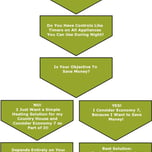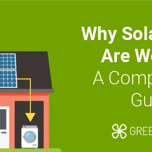Answer these simple questions and we will find you the BEST prices
Which type of solar quotes do you need?
It only takes 30 seconds
100% free with no obligation

Get up to 4 quotes by filling in only 1 quick form

Slash your energy bills by installing solar panels

For the average 2-3 bedroom house
- GreenMatch
- Solar Energy
- compare
- types
- What is the Difference Between Solar Panels and Solar Water Heaters?
What is the Difference Between Solar Panels and Solar Water Heaters?
As green energy becomes more popular, the demand for domestic solutions that exploit renewables keeps growing. For that reason, many alternatives are now available to homeowners who want to reduce their carbon footprint and save up on their energy bills.
If your choice of energy source happens to be the sun, you might already know that two systems are available today: solar panels and solar water heaters.
In this article, we will explain the difference between these two technologies so you can see which is most fitting for your needs.
If you're ready to install solar panels to your rooftop and simply want to get a better idea of local prices for different solar panels, we can help you.
At GreenMatch, we have a broad network of qualified installers solar panel installers across the UK. We can provide you with up to 3 free non-binding quotes from reliable installers based near you. Simple click the button below to start comparing prices and choose the best offer.
- Quotes from local engineers
- Payment by finance available
- Save up to £1,567 per year
It only takes 30 seconds



Learn the Difference Between These Two Typically Misused Terms
While both solar panels and solar water heaters work by absorbing sunlight – and thus need to be placed on your roof, facing south – the similarities between them end there. In fact, they are two very different products.
Two Outcomes: Power and Heat
The first fundamental difference between solar panels and solar water heaters is what they produce. Solar panels exploit the photovoltaic effect by absorbing particles of light (photons), extracting the electrons and leading them through a wire: the flow of electrons itself is electricity.
This is done by using solar cells made of semiconductor materials such as silicon, which have a negative layer and a positive one, creating a magnetic field.
Therefore, solar panels are used to produce some or all of the electricity the house needs. Smaller solar systems will lead to big savings on energy bills, while larger ones can generate enough power to allow you to become independent from the grid.
Solar water heaters, on the other hand, do not produce any electricity. They use sunlight differently, turning it into heat rather than energy. Solar collectors are made of a series of pipes containing a solution that turns solar energy into heat, which is then transferred and stored in a water tank. It can be then used for space heating or to supply hot water. Low-temperature collectors can be used to heat swimming pools instead.
Usually, a solar thermal system will provide 90% of your hot water in the summer, when space heating is not needed, and 40-60% in the winter. Additionally, it extends the life of your boiler by 60%. Alternatively, you can use solar thermal for heating and thermodynamic panels for hot water to go completely green. Since this technology does not generate energy, you will still need to use a little electricity to power the pump.
If your plan is to go 100% green, that electricity could be provided by your solar panels, otherwise you can simply connect to the grid.
One Benefit: Green Energy
Even though the two systems work differently and have distinct purposes, they reach the same goal: using renewable, low cost energy instead of traditional, “dirtier” power sources. Both systems will allow you to save money and help the environment. Once installed, they need little maintenance and provide free energy and hot water.
Finding the right supplier can be difficult and time-consuming. Let us help you by providing quotes from professional suppliers. Simply click the button below, and find the best deal!
- Quotes from local engineers
- Payment by finance available
- Save up to £1,567 per year
It only takes 30 seconds



We strive to connect our customers with the right product and supplier. Would you like to be part of GreenMatch?




